Oil spill on Santa Barbara County coast. A sea lion covered in oil lies on the beach near Refugio State Beach, about 100 feet from where the oil spill flowed into the ocean off the Santa Barbara County coast: photo by Bethany Mollenkof / Los Angeles Times 22 May 2015
Santa
Barbara County oil spill: Toll on marine life begins to show: Monte
Morin and Javier Panzar for Los Angeles Times, 22 May 2015
Crews
are working around the clock to clean up the site of an oil spill in
Santa Barbara County that has sent tens of thousands of crude into the
Pacific Ocean and left even more saturating the soil.
About
100 feet from where the rupture occurred, a sea lion raised its
oil-covered head to the sky and collapsed on the beach. It rested its
head on a rock and rolled onto its back, exposing a shiny, oil-stained
belly.
UC Santa Barbara marine sciences doctoral student Anna
James stopped collecting water samples and looked over at the struggling
animal.
"That poor sea lion really puts it all into perspective," she said.
Sea lions normally run off when humans are near, she said. The sea lion was too tired to move.
The
sea lion, which appeared to be female, wallowed in the sand just below a
rocky cliffside covered almost entirely in black oil.
Marine mammals and fish are turning up on shore
both dead and alive. A pair of cleanup workers in protective suits
walked up the beach with nets and boxes. They were ready to capture and
clean birds, not sea lions.
California Department of Fish and
Wildlife Environmental scientist Colleen Young stopped several yards
short of the sea lion and scribbled down notes.
She said they
would have to wait for a special team trained to deal with sea
lions. Just then, the sea lion rose up on its oil-stained flippers and
began shuffling to the water. It went into the surf and disappeared into
the water.
Young said that even though it was not good for the
sea lion to be back in the polluted water, it does not necessarily spell
disaster for the animal.
The sea lion's blubber will protect it and provide warmth, she said, unlike a sea otter that can suffer with oil in its fur.
"Sea lions can cope with it quite a bit better than sea otters," she said.
A sea lion covered in oil struggles on the beach just west of Refugio State Beach, about 100 feet from where the oil spill flowed into the ocean: photo by Bethany Mollenkof / Los Angeles Times, 21 May 2015
With
all of the perils and risks involved in living in the littoral, there
is, as in all natural communities, a marvelous balance of success and
failure. Take success to mean the ability of the individual to reproduce
itself and the species to continue. California shares, with other
shore-fronting lands, the oldest natural communities on earth. Life
which we assume to have begun in ancient seas has changed less in this
environment than any other. We look back a hundred million years when we
investigate tidal rocks and shores.
Elna Bakker: from An Island Called California: An Ecological Introduction to Its Natural Communities, 1971
The sea lion has oil in its eyes and its flippers.
Marine biologist here thinks it is a female. #SantaBarbaraOilSpill:
image via Javier Panzar @jpanzar, 21 May 2015

Layers of crude oil coat the rocks of Refugio State Beach: photo by Lucy Nicholson / Reuters via Buzzfeed, 22 May 2015
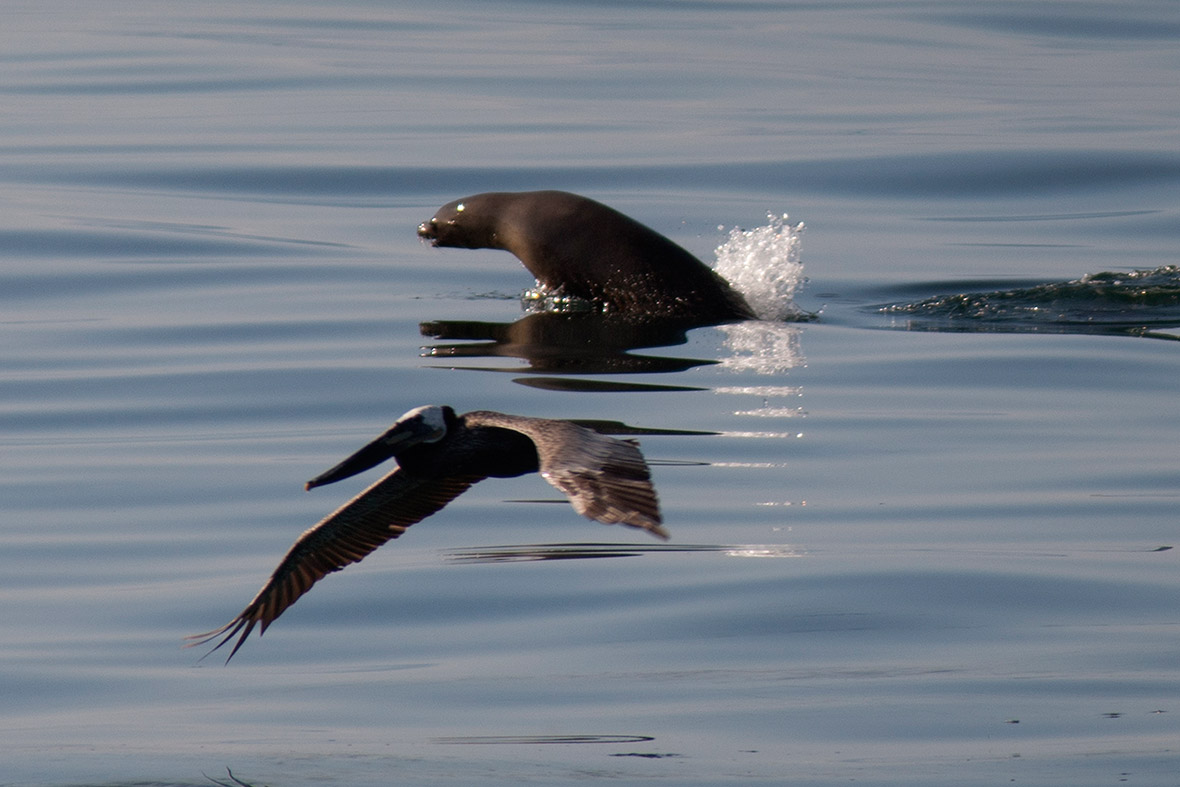
A California sea lion hunts in the oil-contaminated water as a brown pelican flies over, near Refugio State Beach: photo by David McNew via IBT, 21 May 2015
Joseph Ceravolo: Ocean Body
The ocean like an open butterfly
is immobile but still pulsating a little.
The color of the sea
is like a blue butterfly
in the primordial future.
The swell of the body
is like a mammoth butterfly
about to take off from earth
and leave this desert of
a faraway planet
spread before us like a desolate tune.
Joseph Ceravolo (1934-1988): Ocean Body, from Millenium Dust, 1982

Globules of oil can be seen in the waves as the tide rises near Refugio State Beach: photo by David McNew via IBT, 21 May 2015

#PlainsAllAmerican in #Texas responsible for spill in #SantaBarbara. We need to tell Texas to stay out of #California: image via Charlotte Williams @charluv2011, 20 May 2015
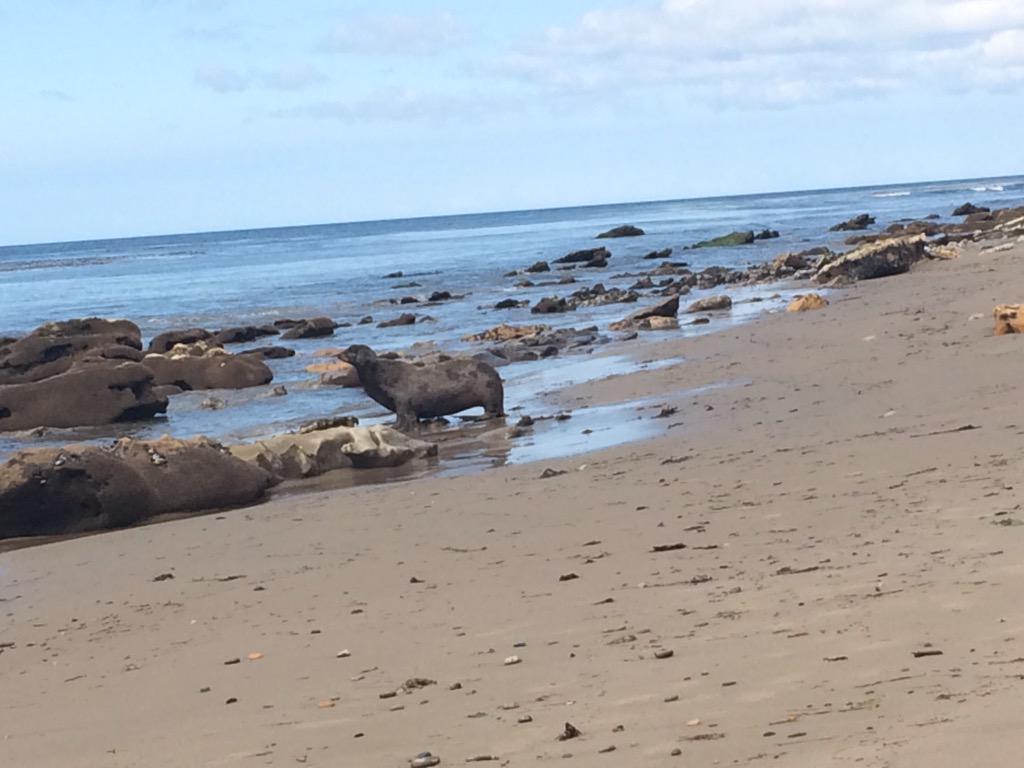

An oil-covered crab died while trying to crawl on the beach in Santa Barbara County: photo by David McNew via LAist, 22 May 2015

California mussels and a crab are covered in oil at Refugio state beach on Thursday: photo by Jae C Hong/AP via the Guardian, 21 May 2015

Globules of oil can be seen in the waves as the tide rises near Refugio State Beach: photo by David McNew via IBT, 21 May 2015

#PlainsAllAmerican in #Texas responsible for spill in #SantaBarbara. We need to tell Texas to stay out of #California: image via Charlotte Williams @charluv2011, 20 May 2015

The sea lion went back into the water:
image via Javier Panzar @jpanzar, 21 May 2015

An oil-covered crab died while trying to crawl on the beach in Santa Barbara County: photo by David McNew via LAist, 22 May 2015

California mussels and a crab are covered in oil at Refugio state beach on Thursday: photo by Jae C Hong/AP via the Guardian, 21 May 2015

An octopus spattered in oil lies on Refugio State Beach on Wednesday: photo by Lucy Nicholson / Reuters via Buzzfeed, 22 May 2015

A shrimp covered in oil at Refugio State Beach: photo by
Lucy Nicholson/Reuters via Newsweek, 21 May 2015

A shrimp is covered in oil on the beach on Wednesday: photo by Lucy Nicholson / Reuters via Buzzfeed, 22 May 2015

A fish covered in oil lies on the sand at Refugio State Beach: photo by Lucy Nicholson / Reuters via Buzzfeed, 22 May 2015

A lobster covered in oil at Refugio State Beach: photo by
Lucy Nicholson/Reuters via Newsweek, 21 May 2015

A pelican covered in oil flies over an oil slick along the coast of Refugio State Beach: photo by Lucy Nicholson/Reuters via IBT, 21 May 2015
Robinson Jeffers: Phenomena
Great-enough both accepts and subdues; the great frame takes all creatures;
From the greatness of their element they all take beauty.
Gulls; and the dingy freightship lurching south in the eye of a rain-wind;
The airplane dipping over the hill; hawks hovering
The white grass of the headland; cormorants roosting upon the guano-
Whitened skerries; pelicans awind; sea-slime
Shining at night in the wave-stir like drowned men's lanterns; smugglers signaling
A cargo to land; or the old Point Pinos lighthouse
Lawfully winking over dark water; the flight of the twilight herons,
Lonely wings and a cry; or with motor-vibrations
That hum in the rock like a new storm-tone of the ocean's to turn eyes westward
The navy's new-bought Zeppelin going by in the twilight,
Far out seaward; relative only to the evening star and the ocean
It slides into a cloud over Point Lobos.
Great-enough both accepts and subdues; the great frame takes all creatures;
From the greatness of their element they all take beauty.
Gulls; and the dingy freightship lurching south in the eye of a rain-wind;
The airplane dipping over the hill; hawks hovering
The white grass of the headland; cormorants roosting upon the guano-
Whitened skerries; pelicans awind; sea-slime
Shining at night in the wave-stir like drowned men's lanterns; smugglers signaling
A cargo to land; or the old Point Pinos lighthouse
Lawfully winking over dark water; the flight of the twilight herons,
Lonely wings and a cry; or with motor-vibrations
That hum in the rock like a new storm-tone of the ocean's to turn eyes westward
The navy's new-bought Zeppelin going by in the twilight,
Far out seaward; relative only to the evening star and the ocean
It slides into a cloud over Point Lobos.
Robinson Jeffers (1887-1962): Phenomena, from Roan Stallion, Tamar, and Other Poems, 1925
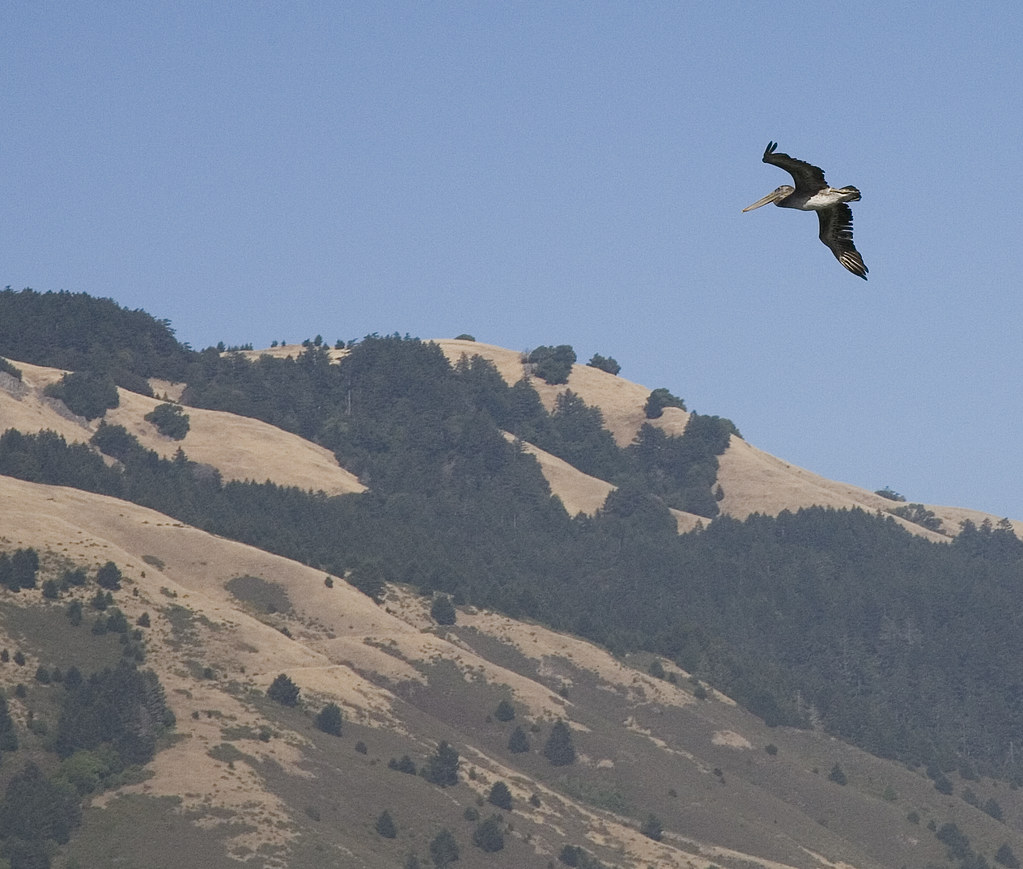
Lone pelican. Mount Tamalpais in background. Taken from Bolinas beach.: photo by Yana Edwin Murphy, 24 July 2007

A pelican covered in oil is seen along the coast of Refugio State Beach in Goleta, California: photo by Lucy Nicholson/Reuters via IBT, 21 May 2015
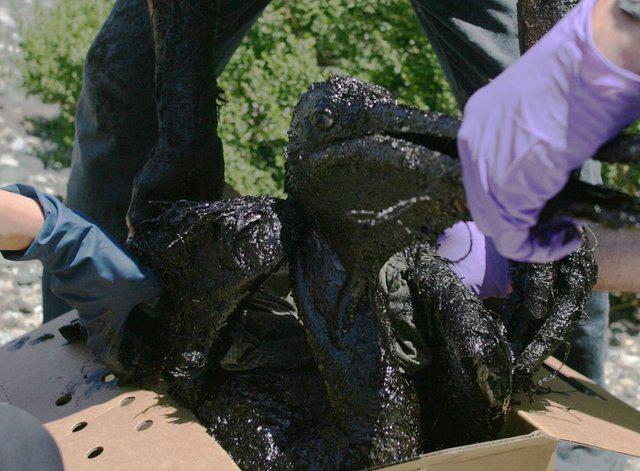
An oil-covered pelican is loaded into a box by California Fish and Wildlife Department workers Wednesday at Refugio State Beach [photo by David Yamamoto]: image via Ventura County Star @vcstar, 21 May 2015
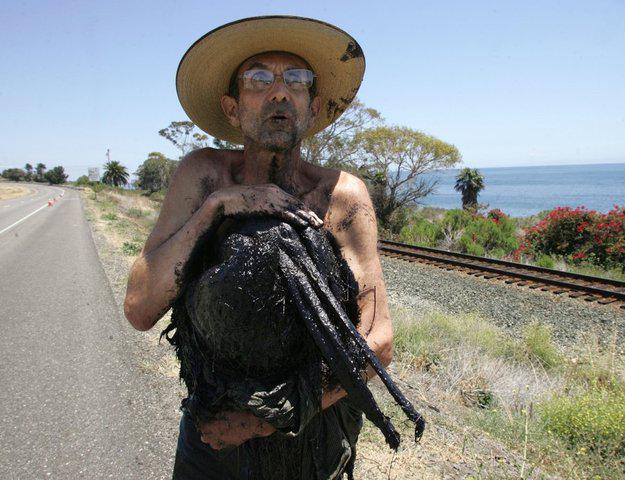
Reeve Woolpert carries an oil-covered pelican he rescued near Refugio State Beach on Wednesday [photo by David Yamamoto]: image via Ventura County Star @vcstar, 21 May 2015
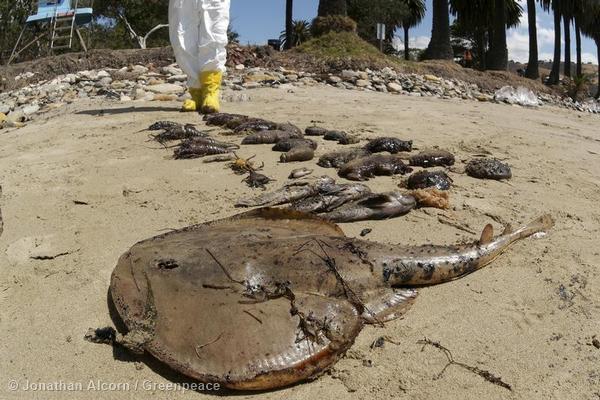
A dead ray, fish, and shellfish lie on Refugio State Beach on Wednesday 20 May 2015: photo by Jonathan Alcorn / Greenpeace. via Mongabay, 21 May 2015
Crews use shovels and rakes to pile oil-contaminated sand on the shoreline at Refugio State Beach near Santa Barbara: photo by Brian van der Brug / Los Angeles Times, 22 May 2015

A remote worker noticed abnormalities in the Plains All America pipeline’s flow around 11:30 a.m. Tuesday and shut it off, according to the company. The cause of the rupture won’t be known until the area can be excavated.rews use shovels and rakes to pile oil-contaminated sand on the shoreline at Refugio State Beach near Santa Barbara: photo by Lucy Nicholson / Reuters via Buzzfeed, 22 May 2015

Placement of Plains All American Pipelines Major Assets: Image via Plains All American Pipelines LP

A remote worker noticed abnormalities in the Plains All America pipeline’s flow around 11:30 a.m. Tuesday and shut it off, according to the company. The cause of the rupture won’t be known until the area can be excavated.rews use shovels and rakes to pile oil-contaminated sand on the shoreline at Refugio State Beach near Santa Barbara: photo by Lucy Nicholson / Reuters via Buzzfeed, 22 May 2015

Placement of Plains All American Pipelines Major Assets: Image via Plains All American Pipelines LP
Oil spill on Santa Barbara County coast. Oil-contaminated sand makes an interesting pattern on the shoreline at Refugio State Beach near Santa Barbara: photo by Brian van der Brug / Los Angeles Times, 22 May 2015
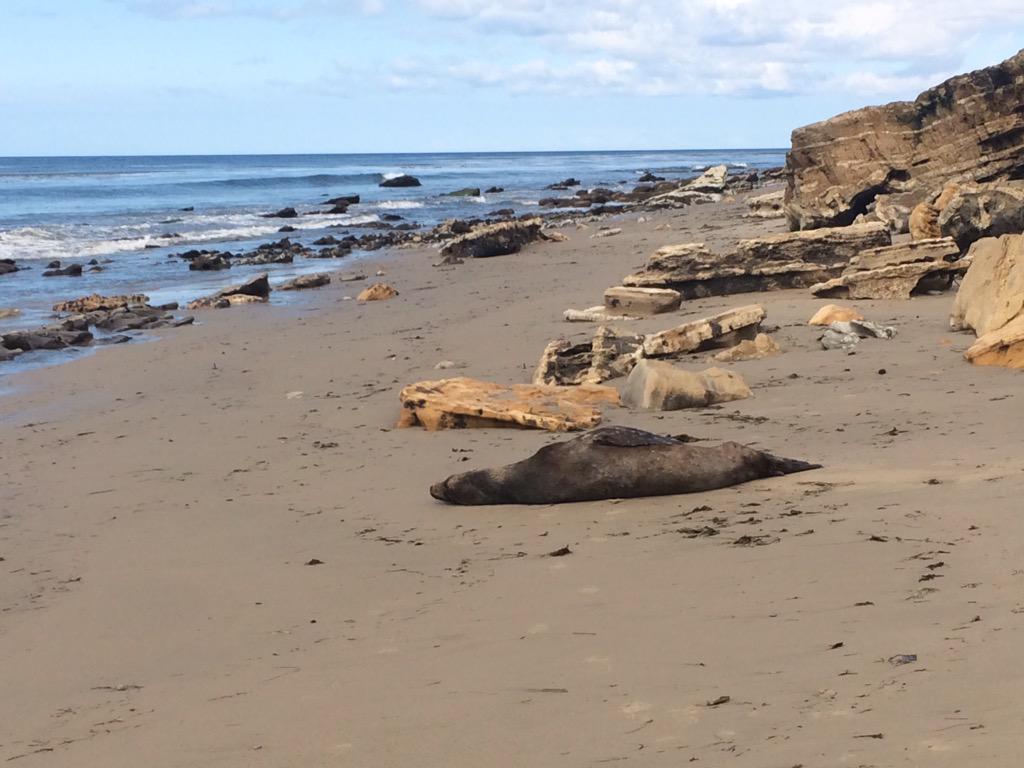
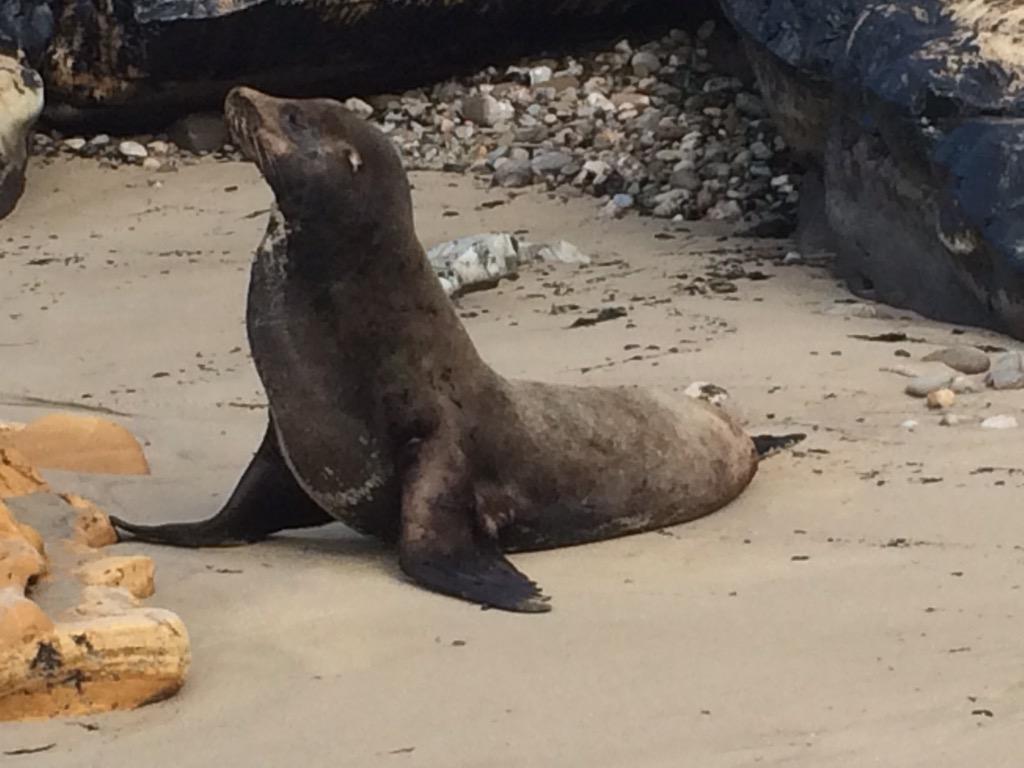
This is really terribly sad...
ReplyDeleteL'Enfant, it's beyond sad.
ReplyDeleteIt's business as usual.
Every day for four years I visited the spot where this nine-mile spill now lies upon the waters.
A paradise, more or less.
That such a place, with such an abundant diversity of life, should ever have been gifted upon humans, is almost impossible to believe.
What the humans have done with, and to it, is perhaps tragic -- though of course all that abundance of life doesn't understand drama.
But it is learning more and more about loss.
The massive peckerwood pipeline company that caused the spill says all its operations have been "within industry standards".
Right, the industry of death, cars, freeways, business as usual, the human legacy to the future.
Tom, looking at your photos reminded me of what a poet once said about this place:
ReplyDeleteThis country is a truly beautiful country.
But a pity the people are so ugly.
Dead animals: dead sea lions, dead pelicans, dead crabs, dead mussels, dead octopus, dead shrimps, dead fish, dead lobsters, dead rays, dead shellfish .....
ReplyDeleteL'Enfant, the new techno elite classes that dominate every part of this country not dominated by rightwing Christian moronism agree on one common and implicit axiom: the car is king, and anything required to keep its tank full of petrol is not only desirable but "necessary"; this includes not only the casual and accelerating sacrifice of all nonhuman animal species but the slower, more gradual extinction of the species at the pinnacle of the new Great Chain of Being: Homo Sapiens, also identifiable as Homo Necans, Man the Killer.
ReplyDeleteGiven the choice between a full tank of gas and a full spectrum of animal life, the American automatically chooses (the brainless expression "no brainer" covers this quite well) the former.
Some might wonder whether the oceans, the skies and the earth itself should be plundered and poisoned and exploited in this aggressive, mindless way, particularly as these Americans are so uncurably indulgent and fond and protective of their precious "kids" (that is, little replicas of themselves), whose future they are in such a rush to cancel.
But no one in Texas would wonder this, and as water, earth and sky are increasingly sold off to the highest bidder, "Texas rules" (drill, pump, frack) automatically win out, even if the gross profits in Houston are shared neither with the fauna and flora nor with the mindless and insouciant two-footed predator at the top of the decision chain in California (also known as "the taxpayer").
Some might wonder, why lease rights to tap and pump oil from a marine sanctuary to a company with a long and ugly record of environmentally disastrous "accidents"?
Do take a close look at the graphic showing the massive reach of this company's "assets" and you'll see the whole history of today's America del Norte writ large, stretching from the "tar sands" obscenity in Alberta (oh, those "superior" Canadians are actually in greater haste even than the Yankees when it comes to selling off their environment) to the filthy cesspool which is the Gulf of Mexico.
Those guys have got the whole continent covered, and are continuing to foul it up forever, even as these futile keystrokes are wasted.
But anybody who wants to get to the "bottom line" (apt expression invented by the same brilliantly and triumphally suicidal "culture" that invented "time is money") ought to check out the stock market trajectory of Plains All American Pipeline shares over the past 72 hours or so.
But of course nobody will want to bother to do that, unless they are "trading" in the "market".
And to the vast relief of the "market", after an initial slight wobble, PAA shares bounced right back up.
Score one more for Wall Street, where this country's real deals are done, and where nobody would know or (of course) care about the difference between a mussel and a muscle.
Unless they were in a restaurant.
K, the ugliness is in the soul, not the body, and it fairly shines out, like luminous mud. The "beautiful" (cosmetic artifact) people, the "iconic" movie and pop culture glamour stars, possess, to this ancient, jaded eye, all the beauty of a pool of axle grease under a parked "energy efficient" (!) motor vehicle.
ReplyDeleteThe most beautiful people I've seen lately are those stateless, suffering, forgotten Rohingya. Their beauty shines out from an occluded soul. Yet it has and sheds a light.
Some years back, when I was still able to get around on foot, my nightly course took me past the world-famous high-end eatery "Chez Panisse". Out front there would be, routinely, rows of fancy limos parked and waiting. Wealthy Asian tourists would be packed in front of the "iconic" entrance, snapping pictures of themselves and each other, as a prelude to entering, being served, and photographing microscopic portions of exquisite gourmet delicacies, commoditized before being consumed.
Less wealthy Americans, unable to drop hundreds of dollars on a single meal, would commonly be packed in small huddles before the day's menu, posted in a glass case before the entrance. Often, again, one would see pictures being snapped.
This is religion, as practised here.
It was also customary to see Americans of considerable clout and magnitude -- governor, senators, media and businessworld supermoney heros and heroines, the objects of the envy of all -- trailing in and out of the same fancy joint.
If America has cathedrals, this would be one. If America has worship, it would be on display here.
In mid of night, the rows of trash bins outside the place would always be stuffed to overflowing with the leavings of the greedy rich. Emptied and dumped as garbage by dawn.
And too, one would often see private ambulances outside the place. One evening, curious, I enquired of an ambulance attendant, and learned that the puffy (yet of course "distinguished"-looking) middle-aged white man, who could be seen sitting up inside the ambulance, was in fact, "okay".
"No big deal," said the attendant. "He just ate and drank too much. Happens all the time. His wife will take him home. He'll be fine in the morning."
Always a bright new day, another profitable deal to do.
The Beautiful People.
It's strange you say that about the Rohingya, Tom..I was thinking the same thing when I saw that photo of a beautiful and charming young girl you posted.
ReplyDeleteOf course there's a danger of romanticizing, but got the same impression looking at Thesiger's pictures of people who lived under extremely harsh conditions (i.e. in his 'Visions of a Nomad').
Dear T: I admire the way you always look directly at and into the devastation & conflict that seem so pervasive everywhere on the planet. The poems here are like artifacts from a now-lost universe. I find myself wanting to look away, turn off the machines, and hope for the best. On the oil front---we have railroad tracks about a half mile from our house, and occasionally we have to wait for the freight trains to roll by. I always count the cars. A few years ago, they averaged about 80; the last train I counted a few weeks ago had 137 cars, probably half of which were oil tankers. As you know, there are almost no safety measures in place when it comes to this particular "pipeline." If any of these trains derail (a la Amtrak), I think my neighborhood will look like Hiroshima. (I wonder if any terrorists out there have noticed this ulnerability.)
ReplyDeleteK, the wonderful Thesiger, who lived to be 93, never ceased hating cars and aeroplanes, traveled the Empty Quarter and the empty quarters, on foot, by camel, on horseback, after the manner of the indigenes, whose trust he won, and whose ways he brought us closer to than anyone else from "out in the world" would ever do.
ReplyDeleteI do see that resemblance, and have myself for some nights been thinking about those Rohingya girls, in their finery, amid hellish circumstance. Their beauty suggests an inner fire, an indomitable life that may have to do with youth, but finally seems to have more to do with courage.
Here is one young woman Thesiger photographed while traveling in the Barir Valley of Pakistan in August or September of 1952.
Wilfred Thesiger: Kalash woman wearing a hat ["Portrait of a young woman with plaited hair, wearing beaded necklaces and a hat decorated with many rows of shells"]
And then his description of a woman, this one not so young, encountered on the gravel plains of Oman, in Arabian Sands:
"Once we passed a dozen camels tended by a woman with two small children. Al Auf said, 'Let's get a drink', and we rode over to them. He jumped from his camel, greeted the woman, a wizened old thing bundled up in black cloth turned green with age, took the bowl which she handed him, and went towards the camels. She shrilled at her sons, 'Hurry! Hurry! Fetch the red one. Fetch the two-year-old. God take you, child! Hurry! Fetch the red one. Fetch the two-year-old. Welcome! Welcome! Welcome to the guests!' Al Auf handed us the bowl and in turn we squatted down to drink, for no Arab drinks standing, while the old woman asked us where we were going. We answered that we were going to fight for the Al bu Falah and she exclaimed, 'God give you a victory!'"
__
Terry,
Alas it seems the the relentless quest of the moneybags for oil is a monomania exercised in the face of unimaginable catastrophe, Black Swan events clustering on the Deepwater Horizon to fill up all the little time that remains to the living with viscous horrors.
The O'B administration now blithely proposes to drill not only in the remoteness of the Arctic but in the nearness-to-you of pretty much the whole Atlantic seaboard.
We already have this. The major refineries up the road are constantly "flaring" and "releasing", just to keep our nerves on edge. The "street" we live on is a lethal speedway. Seven people on this block have been killed by cars in our time here. I came a half pint or so of blood away from being #8, and though I will never again place myself behind the wheel of a motor vehicle, and in fact haven't done so in nearly a half century now, I'll never again walk or stand without pain, thanks to cars.
The stench of emissions hangs heavy in the air at rush hour, which begins at about 7 in the morning and doesn't taper off until about 8 at night, if then.
Drivers take this nightmare as SOP and spend hours on the freeway every day, as though fate required it.
The pipeline pirates who have fouled one of the most beautiful coastlines on earth are "facing" some negligible fine. I believe the top limit on federal fines is about half a million dollars. To a company of this dimensions, that wrist-slap wouldn't even be felt.
Meanwhile, Plains All American has put out a statement, saying, unbelievably, they regret any "inconvenience" caused by their spill.
Tell that to an oiled pelican.
Yes, I really love that picture as well (put it up somewhere on the blog). Thanks for sharing it!
ReplyDeleteWhen you first mentioned your dislike of cars-when I first came here-I immediately thought of Thesiger. Old school!
Your quote reminds me of a passage from Asad's 'Road to Mecca'. Will try and find it. A great book-until he becomes a Muslim! But the descriptions of the desert are up there with Exupery's.
Salams,
b.
Tom, here is a young french poet talking (sorry for my poor english) : thank you for your poetical documentation of the way oil industries do murder our world. I am afraid that europeans are as "brain less" as american on the "car topic" - actually, those who understand the very simple idea that destroying the earth is destroying ourselves are to few to make a major change happen.
ReplyDeleteOn this topic, politics is our only salvation path and if poets can helps politics, lets all of us who believe in and write world's beauty make a move in this direction.
I don't know if you read french, if you do please have a look to my digital poems, any of your comment would be of great interest to me : http://www.eclipse-digitale.net/
Poétiquement,
Bastien